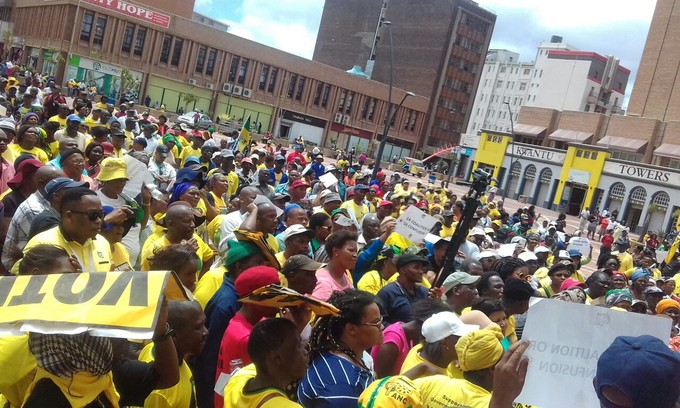
PE residents, many of them wearing ANC T-shirts, marched to City Hall yesterday, protesting electricity cuts. Photo: Joseph Chirume
2 December 2016
Nearly 1,500 Port Elizabeth residents marched to City Hall yesterday to hand over a petition to recently elected mayor Athol Trollip (DA). They want the mayor to reverse the recently introduced policy of cutting electricity and water supplies to houses that are in arrears.
The march was sparked after the Nelson Mandela Bay Municipality introduced punitive measures to force residents to pay their bills. In its recent audit the City identified 3,400 households whose water and electricity metres would be disconnected because they owed money.
Some residents claimed their debts had been erased by the previous ANC government because they were too poor. This was after they were declared poor enough to repay their debts. The residents yesterday said they were shocked to find out that the new Democratic Alliance- led government has reversed that and were being made to pay for the debts they considered had been erased.
Nomakhaya Limba, 73, of KwaNobuhle, Uitenhage explained: “I generated a debt of R760 in 2015 because I had a problem with my social grant card. I went to my local councillor who helped me to have my debt cleared without paying anything. This was because the then ANC-led municipality introduced an amnesty to people who could not meet their debts due to unemployment, old age, disability or [because they were] child-headed homes. This benefited many people including myself. [I was] shocked on Tuesday after my electricity card was blocked.”
Nomakhaya said all her efforts this week to reactivate her card were unsuccessful despite approaching her local customer care centre three times . “When I went to the Customer Care Centre in town I was angered when told that in addition to the money that I owed, I was compelled to pay an extra R340 fine for my card to be re-activated. This is the reason I am taking part in this march. I want the mayor to explain to us in person because many stories are being said about this issue. This is not political because I am a church goer.”
Andiswa Sikwela, a 36-year-old single mother, has been without electricity for a week. She disputed the R3000 bill she says she has received. “There has never been a month we skipped paying our bills.I know this municipality is notorious for wrongly billing its residents, but why me?” she asked.
“The officials at the municipality told me to first settle the bill plus the R340 re-connection fee before they investigate. This is boggling my mind. Where will I get that amount? I am just a security guard and earn far below that amount,” she said.
A high school teacher who lives in Zwide who did not want his name mentioned said he had to use money meant for school fees for his children to settle his R1,300 debt. He said “The municipality inconvenienced us by shifting from its old system whereby money owed was gradually deducted in small amounts when you went to buy electricity. If you wanted electricity for R20,the municipality would deduct R8 and you ended up getting a token of R12.This would continue until your bill was cleared up. Now they want the whole amount to be settled instantly. Also the municipality advertised that defaulters would have 30 days to settle their bills and a further 15 days before they disconnected. This is creating confusion and people are beginning to panic because the system is just not operating.”
Political leaders, including ANC spokesperson Zizi Kodwa and the UDM’s Xolile Klaas, addressed the protesters and took turns to slate the mayor and his deputy. There were also EFF and Cope representatives. UDM speakers slammed the deputy-mayor even though he is a UDM member, and the UDM is in coalition with the DA.
From the City Hall the marchers proceeded along Military Way to the Woolboard Exchange building. They handed over a petition to council speaker Jonathan Lawack with city manager Johann Mettler witnessing.
The petition demanded the immediate end to the disconnections. It contained several demands unrelated to the protest. The mayor was given 14 days to respond to the petition.
Deputy-Mayor Mongameli Bobani (UDM) said opposition parties were confusing residents.”In fact we have improved the lives of the poor in the few days we have been leading this municipality. We do not have any intention to punish the poor. … those who have not been identified as poor should pay their bills. We have increased to 23,000 the number of households that are to be given preferential treatment. These are the poorest of the poor and they need our support. We have put adverts in radios and newspapers explaining how the process works.”
Bobani encouraged residents with grievances to approach their nearby customer care centres for clarification.